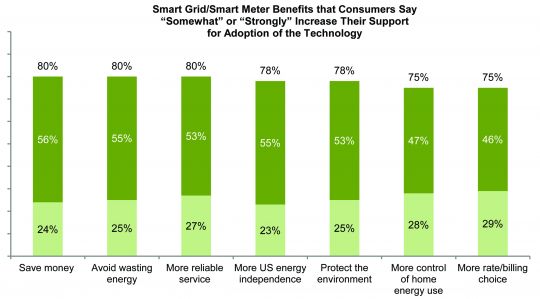GridWeek is upon us, and customers continue to be a hot topic. To fuel the debate, companies and organizations are rolling out consumer surveys relating to smart grid and energy efficiency.
In a survey put out Monday by the Smart Grid Consumer Collaborative, 78 percent of more than 1,000 respondents said protecting the environment would somewhat (light green in graph below) or strongly (dark green) increase their support for smart meters/smart grid adoption (although there’s even more data that most consumers worldwide can’t even define 'smart grid.' It's no wonder, since the industry can’t agree on one definition either).

But back to those percentages. In the SGCC’s survey, protecting the environment ranked nearly as high as saving money, avoiding wasting money, more reliable service and energy independence as a motivation for supporting smart grid initiatives. However, when the question was posed in a different way to people who already had smart meters, it provoked a very different set of answers. In a separate survey by Green Research for Silver Spring Networks of approximately 1,000 smart meter customers, more than half of respondents said that they like to save money on their electric bill but don’t obsess about it, and 35 percent said they track their expenses closely and look for ways to save money. However, only 8 percent said they care about the environment and would do what it takes to go green, even if it costs a little more.
Other research has shown that only a small portion of customers are motivated by environmental factors. So instead of greenwashing, utilities can go with other messages or have segmented messages for different groups (gasp!).
Respondents in both the SGCC and Silver Spring surveys like the idea of more reliable service. In a world of blackouts stemming from heat waves, cold snaps, and human error, there is virtually no region of the U.S. that can’t relate to the problem of devastating outages.
Ditto on energy security and/or independence, although electricity in the U.S. is largely produced by domestic resources.
Even money -- and everyone likes saving money -- is not a driver for all. When customers raged against Baltimore Gas & Electric for cycling off their AC units during a heat wave, there was a breaking point where the payback (it was a voluntary program) was not regarded as being worth the sacrifice of comfort. And some of the biggest residential energy hogs can afford their pool pumps, so those who frame the problem as saving money versus entertaining poolside may favor the latter.
The Silver Spring Networks survey reinforces that people care about money, but only to a point. But they found a real driver is control. Greater choice over how much people pay for electricity and having control over their electricity bill rated high. By giving people information and ways to take action, utilities will win friends and influence people. Or at least gain a smidgen of trust with consumers.
The issue of trust was also already raised on the first day of GridWeek. People hate their utilities, yet they look to them as an impartial judge of energy efficiency technologies. Hopefully, the rest of the week can produce answers on how to reconcile those two sentiments, and not just repeat the question.



